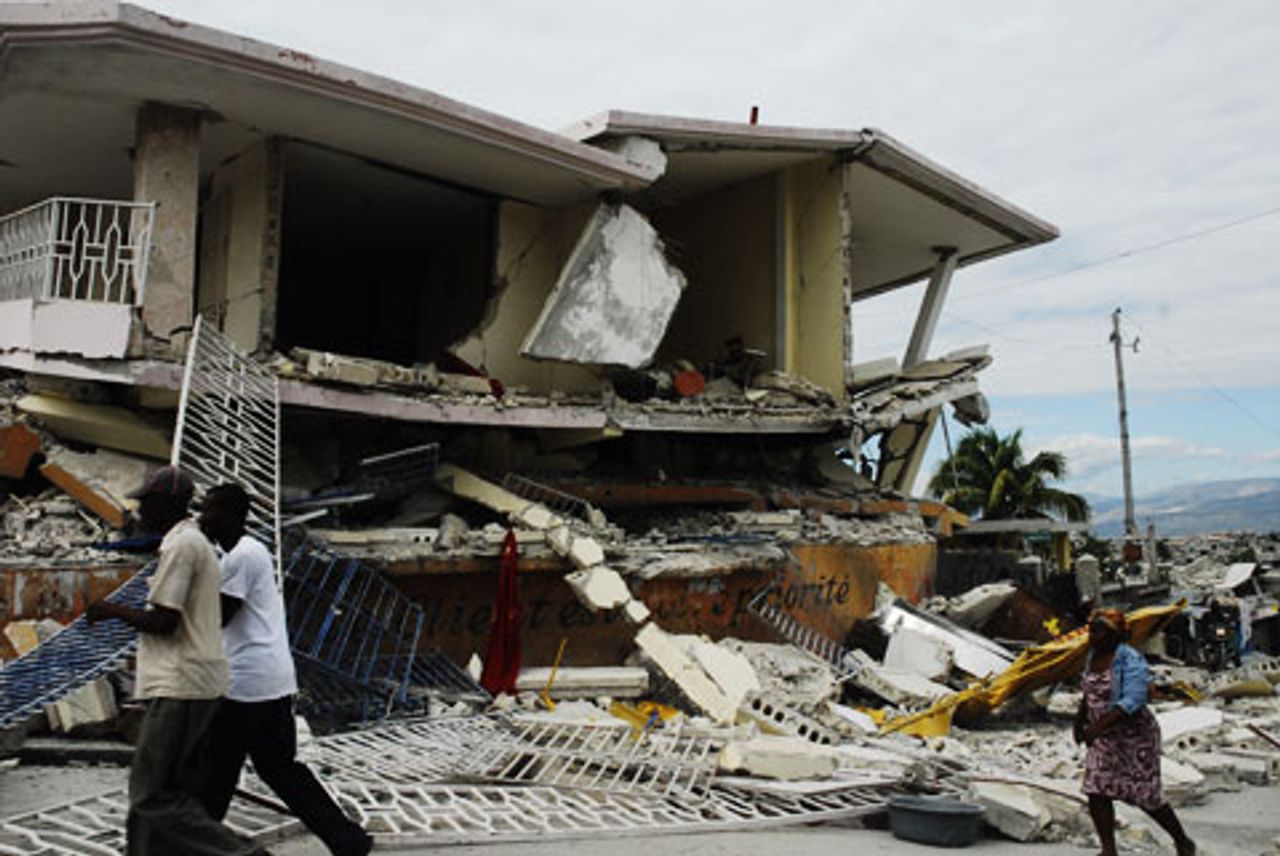The disaster caused by the January 12 earthquake in Haiti is the worst in modern history, according to a new report by the Inter-American Development Bank (IDB). Up to 250,000 people have been killed, and up to $14 billion in damage has been caused by the quake, which rated a 7.0 on the Richter scale.
The IDB report used regression analysis on data collected from 2,000 natural disasters that occurred worldwide between 1970 and 2008. Examining the effects of the disasters on the countries in which they took place, the authors of the IDB report were able to predict the cost of damages for “a country with Haiti’s economic and demographic characteristics.” As the report states, “The nature of the exercise we perform is simple. It uses historical data on catastrophic events and econometric techniques to answer the following question: what are the expected costs of reconstructing Haiti’s infrastructure?”
 A scene from the devastation in Haiti
A scene from the devastation in HaitiAt the very least, the report concludes, it would cost $8.1 billion to restore the infrastructure of a country with Haiti’s “observable characteristics” that has suffered a natural disaster causing a death toll of 250,000. The report indicates that the cost is, in reality, likely to be far higher, reaching up to $14 billion in damages. To put the sums in greater context, Haiti was already the poorest country in the Western Hemisphere when the earthquake struck in January; its GDP is just $6.95 billion per year.
“There are few events of such ferocity as the Haiti 2010 earthquake,” says the report. “It is the most destructive event a country has ever experienced when measured in terms of the number of people killed as a share of the country’s population, and it has affected the capital city of the country: the center of commerce, government and communication.”
There have been up to 25,000 people killed for every 1 million inhabitants of Haiti, a country with a total population of just over 9,780,000. This staggering ratio far outstrips even the worst disasters previously recorded, including the earthquake that struck Nicaragua in 1972, killing 10,000 people in all or 4,046 people per every million inhabitants. Until the Haiti earthquake, that disaster held the record for the most number of people killed per million inhabitants.
The disaster in Haiti has broken every record under review, making it not only the worst disaster in modern history, but the worst by far. More people were killed in the Haitian earthquake alone than were killed in the 2004 Indian Ocean tsunami, which claimed 226,000 lives across 12 countries. The cost of damages suffered by Haiti during the earthquake amounts to 117 percent of the country’s annual GDP. Prior to this, the record for such economic devastation was also held by the 1972 earthquake in Nicaragua, causing damages equal to 102 percent of that country’s GDP.
The scope of the disaster in Haiti is unprecedented. The IDB also makes clear that any recovery efforts, were they to be at all adequate, would also need to be unprecedented. The IDB web site reports a forthcoming study by its organization that shows “countries hit by disasters on this scale suffer an economic setback that can take decades to reverse.”
“In several such countries,” the report states, “investigators found that even with big inflows of outside aid, GDP per capita was up to 30 percent lower 10 years after the disaster than it would have been if the country had been spared.”
The IDB report warns that aid could be “constrained by the capacity of institutions in Haiti to manage and execute the projects to be financed,” and goes on to say, “excellent coordination of funding and of execution will be the key to ensuring the efficient use of funds.”
Far from an “excellent coordination” or execution of relief efforts, the official recovery efforts set in motion in the days and weeks following the earthquake have been a travesty, only compounding the suffering of the masses of the starving and homeless in Haiti. Emergency food and medical supplies sat untouched in airport hangers, or relief shipments were turned away altogether as the US military took control of Haiti’s only airport and gave priority to the transportation of “security” forces over essential relief supplies.
While the numbers uncovered by the IDB report shed new light on the dimensions of this social catastrophe, they are only preliminary figures. With the rebuilding of Haiti subverted to profit interests, and the relief and recovery efforts dominated by the US military, still more devastation lies in store for the Haitian people.
